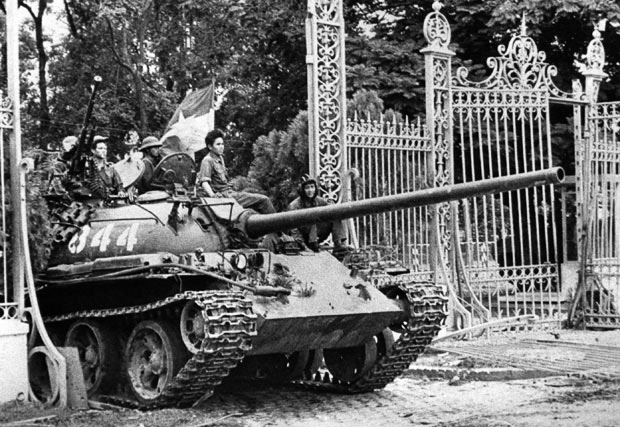|
North Vietnamese tank 844 rolls through the gate of the Presidential Palace in Saigon on April 30th 1975. Photo: AP
|
Dean's Lecture Series:Un/conventional War1006 Humanities Bldg Wednesdays, 4:00 – 6:00 p.m. |
This series seeks to explore and compare various types of war. Waging war has meant different things at different times, and soldiers, civilians and scholars have offered multiple and conflicting visions of what is (or what should be) war. The concepts "conventional" and "unconventional" capture expectations about war and a set of implicit or explicit rules, which opposing forces agree to respect or systematically violate. Lectures will address what makes a war conventional or unconventional and how these notions changed in history. Speakers will also address how given conflicts are remembered, represented, and analyzed.
Spring 2016 Lectures:
March 2, 2016: Patrick Deer, New York University – “America’s Wars and Recent Memory: the Struggle for Lost History in Iraq War Writing.”
This talk explores the struggle over lost history in recent Iraq and Afghanistan war fiction. This desire for history and the historic, I argue, is mediated by an obsessive intertextual engagement with other American wars, notably WWI and Vietnam, and with damaged collective memory rather than individual trauma. Can acclaimed war writers like Brian Turner, Lea Carpenter or Sinan Antoon give us the coherence, authoritative narratives or closure so lacking in our politics or wartime culture? This challenge is especially timely given the lack of a cohesive historical narrative for America’s recent wars, the material loss of the wars’ military archive, and an intensely divided and confusing “Homeland” culture.
March 30, 2016: David Silbey, Cornell University – “Losing Imperial Wars: The United States and Irregular Warfare, 1898-2015."
“Despite becoming the world’s unrivaled superpower, the United States has had increasing difficulties in winning its wars outright. Instead, it has experienced a series of difficult little imperial conflicts, in which countries with substantially less military power have nonetheless prevented the US from achieving victory. This talk will discuss why that is the case by focusing on the development in the 20th century of a conventional model of war, dependent on heavy industry, mass manpower, and high technology, and its antithesis, an irregular model of war that emphasized popular will, guerrilla tactics, and the protraction of conflict. In essence, the avatar of conventional warfare, the United States, has faced an opposing model designed to deny America victory.”
April 20, 2016: Mariano Siskind, Harvard University – “Latin American Literature and World War I: Notes Towards a Redefinition of Global Modernism.”
Is World War I a Latin American event? To what extent can one consider World War I a Latin American war? In what sense could the worldly predicate of the Great War include Latin America? Taking these obviously counterintuitive questions as a point of departure, this lecture traces a large archive of hitherto unexamined Latin American poems, essays and crónicas that should be inscribed in the transcultural but nevertheless provincial discursive field that sustains the modernist discourse on the Great War. The critical consideration of this overlooked archive expands the symbolic making of the War's globality changing the meaning of the world in the signifier 'World War', thus opening up the possibility of a disciplinary redefinition of the concept and practice of global modernism.
Fall 2015 Dean's Lecture Series: Indegeneity
Wed., September 30, 2015: Judith Zeitlin, Anthropology, University of Massachusetts at Amherst – “Indigeneity in Late Colonial Mexico: Rethinking Notions of Blood and Identity”
Wed.,October 21, 2015: Shannon Speed, University of Texas at Austin – "Indigenous Women Migrants in the Era of Neoliberal Multicriminalism."
Mon., November 2, 2015: Luis Caramo-Huechante, University of Texas at Austin – The Racialized Site of Sounds: Mapuche Art and Territorial Memory in Times of Acoustic Colonialism
-
See pages2015 fall
-
See pagesSymposium
-
See pages2016 fall
-
See pages2016 spring
-
See pages2017 fall
-
See pages2017 spring
-
See pages2018 fall
-
See pages2018 spring
-
See pages2019 fall 2023 spring
-
See pages2019 fall 2023 spring images
-
See pages2019 spring
-
See pages2020 fall
-
See pages2020 fall images
-
See pages2020 spring
-
See pages2020 spring images
-
See pages2021 fall
-
See pages2021 fall images
-
See pages2021 spring
-
See pages2021 spring images
-
See pages2022 fall images
-
See pages2022 spring images
-
See pages2023 fall
-
See pages2023 fall images
-
See pages2024 fall
-
See pages2024 fall images
-
See pages2024 spring
-
See pages2024 spring images
-
See pages2025 fall
-
See pages2025 fall images
-
See pages2025 spring images
-
See pagespressing matters
-
See pages2015 fall
-
See pagesSymposium
-
See pages2016 fall
-
See pages2016 spring
-
See pages2017 fall
-
See pages2017 spring
-
See pages2018 fall
-
See pages2018 spring
-
See pages2019 fall 2023 spring
-
See pages2019 fall 2023 spring images
-
See pages2019 spring
-
See pages2020 fall
-
See pages2020 fall images
-
See pages2020 spring
-
See pages2020 spring images
-
See pages2021 fall
-
See pages2021 fall images
-
See pages2021 spring
-
See pages2021 spring images
-
See pages2022 fall images
-
See pages2022 spring images
-
See pages2023 fall
-
See pages2023 fall images
-
See pages2024 fall
-
See pages2024 fall images
-
See pages2024 spring
-
See pages2024 spring images
-
See pages2025 fall
-
See pages2025 fall images
-
See pages2025 spring images
-
See pagespressing matters

